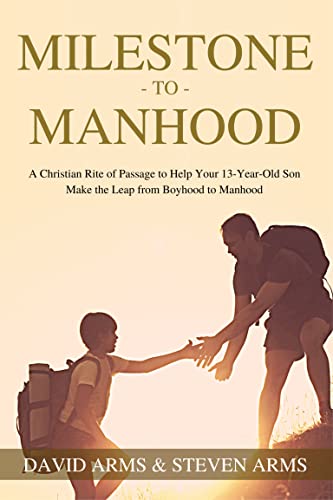How do you help your son become a virtuous man? It’s a question every Christian boy’s parents have to discern, and – of course – requires a lifetime of modeling and trial-and-error. But there is something to be said for formal ceremonies, too. David Arms and Steven Arms reveal their family tradition in Milestone to Manhood. Initiation rituals are a part of many cultures, but they aren’t common in modern America. There are some important events – confirmation, graduation – but even those have a different character from a formal declaration that a boy has earned the responsibilities of a man from the men he respects. Enter the Rite of Passage (ROP) weekend. Part memoir, part guide, Milestone to Manhood is an insight into what a father can do today to usher his son into manhood.
In Part 1, Steven Arms recounts his perspective as a thirteen-year-old experiencing his Rite of Passage weekend. In Part 2, the authors put the events into a framework for others to follow, with notes on how to organize it, what features are most important, and what other events should be taken into consideration for the weekend. Features of the ROP include: the father inviting his son’s male role models, making the weekend a surprise to the boy, an entrance ceremony, an open fire representing God’s presence, sharing what it means to be a man, giving a gift, scripture sharing, a ribbon ceremony with discussion of vices and virtues, bestowing of the title of man, and a final blessing.
The biggest concern some fathers will have is the formal nature of the ROP – “Isn’t it awkward? Isn’t it cheesy?” That’s a decision you have to make for yourself. David (the father) and Steven (the son) share their memories of Steven’s Rite of Passage weekend, and Steven is honest in his recollection of the various feelings you’d probably expect from a thirteen-year-old – the lack of enthusiasm about a trip with his father, the unease of having big conversations with men he respected, and the accompanying pride for the same reasons. Rituals aren’t easy, and they can feel a little forced, but as David and Steven argue, boys want affirmation and to be heard from their fathers. If they don’t feel like they are respected as they grow up, they might seek affirmation in ways that are often stupid and harmful.
One weekend can’t ‘fix’ a relationship – if you’re coming to this as some sort of way to set things right or change someone’s behaviors, that’s not what this is for. Instead, it’s an impactful way to reinforce the virtues of manhood your son has hopefully begun to develop–and warn him about the vices. One gift given over the ROP is a collection of letters from various adults that the boy takes with him and can read, over and over, for the rest of his life. These are the sorts of memories that can give people strength in difficult times. For a society where some young adults are stuck in a permanent adolescence and some parents hover to the point of stunting their children, it can be good for both parties to acknowledge that your boy is growing up and should bear more rights and responsibilities.
Even though the author is Catholic, the rite of passage is presented as an event for all Christian denominations. And although all teenagers would benefit from such a weekend, Arms’ rite of passage is explicitly meant to encourage a relationship with Jesus Christ. Secular readers might be inspired by some of the general ideas, but nonbelievers likely won’t want to work through this book.
The authors helpfully include a couple of indices to discuss options for other arrangements – for boys of single mothers, and for mothers to put on a rite of passage for their daughters. I understand why there wasn’t much room devoted to these topics, but I would love to hear more from people who have used this model in these situations. To state what might be obvious, I’m not a father or a man – but I have a son, and I’m hopeful my husband will offer something like this. And if I have a daughter, I’d be curious to hear more about their ideas for that event. I already know there are some things I would want to change or wouldn’t be comfortable doing, but the authors make a convincing case for why certain features are important. You – hopefully – know your child best, so you can make slight tweaks to suit your situation while maintaining the spirit of the event: to dig deep and provide affirmation and direction as your child grapples with adulthood, to keep them from the harmful rituals of society.



